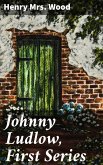In "Johnny Ludlow, Third Series," Henry Mrs. Wood continues her exploration of the intricacies of 19th-century English society through the eyes of a young protagonist, Johnny Ludlow. This volume is characterized by its rich character development, drawing readers into a world where social class, morality, and romantic entanglements are intricately woven into the fabric of everyday life. The narrative is marked by its vivid descriptions and a keen psychological insight, reflecting the Victorian literary context in which Wood operated, often revealing the tension between personal desire and societal expectation. Henry Mrs. Wood, an influential novelist of her time, utilized her keen observations of human nature and social dynamics to craft stories that resonated deeply with her Victorian audiences. Her background as a journalist and her own experiences with the complexities of relationships undoubtedly shaped her writing, making her characters both relatable and timeless. In "Johnny Ludlow, Third Series," Wood masterfully blends her understanding of societal norms with engaging storytelling that evokes empathy and reflection. This volume is a compelling read for those interested in Victorian literature, social critiques, and character-driven narratives. Fans of intricate plots and moral ambiguity will find themselves immersed in Johnny's adventures, as Wood offers both entertainment and a thoughtful examination of the human condition, making it a significant contribution to the literary landscape.
Dieser Download kann aus rechtlichen Gründen nur mit Rechnungsadresse in A, B, BG, CY, CZ, D, DK, EW, E, FIN, F, GR, H, IRL, I, LT, L, LR, M, NL, PL, P, R, S, SLO, SK ausgeliefert werden.
Hinweis: Dieser Artikel kann nur an eine deutsche Lieferadresse ausgeliefert werden.









